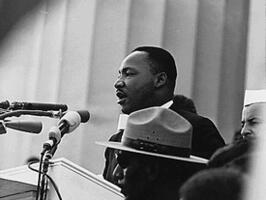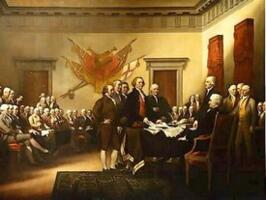Public Opinion Leads, Politicians Follow
A Commentary By Scott Rasmussen
On Dec. 1, 1955, a churchgoing woman of character refused to give up her seat on a bus in Montgomery, Ala. Many credit Rosa Parks' courageous action that day with launching the civil rights movement. While I have great respect for what Ms. Parks did that day, however, she did not start the civil rights movement. The movement began long before, and public opinion led the way.
Rosa Parks' role was to serve as a catalyst converting the shifting public opinion into meaningful action. Martin Luther King Jr. then gave voice to that movement and made it an essential part of our national heritage.
We know that public opinion moved first because Rosa Parks had done the same thing on the same bus line 12 years earlier. But in 1943 nothing happened. Neither her community nor the nation was ready.
Between 1943 and 1955, there was massive change. Jackie Robinson broke the Major League Baseball color barrier by playing for the Brooklyn Dodgers. Black soldiers came home from World War II and were not going to settle for the way things had been. The then-new technology of television turned a national spotlight on the Jim Crow South. That's what laid the groundwork for the heroism of Rosa Parks. Even after she acted, it took a decade before Congress acted.
By the time the Civil Rights Acts were passed, two-thirds of American voters supported them.
Public opinion leads, and politicians lag a decade or two behind. It's always been that way.
Next week, we will celebrate the 237th birthday of the United States. More precisely, we will celebrate the signing of the document that founded our nation, the Declaration of Independence. But it was public opinion that made the colonies independent.
In 1765, 11 years before the Declaration was drafted, the Stamp Act enraged colonists and led some to challenge the authority of their king. The years that followed featured the Intolerable Acts, the Boston Massacre, the Boston Tea Party and more. The willingness to challenge the crown was growing.
Most significantly, on April 19, 1775, the shot heard round the world was fired on the Lexington Green. Following the "battle" of Lexington and Concord, the colonists were at war with England. It took another 15 months before the Continental Congress drafted the Declaration of Independence and six years before the British surrendered at Yorktown. Another six years would pass before the U.S. Constitution was written.
In the American Revolution, public opinion moved first toward independence. The events at Lexington and Concord served as a catalyst, and the Declaration gave voice to the movement. It defined our national ideals of freedom and liberty, and our belief that governments derive their only just authority from the governed.
Those ideals have played a powerful role in our nation's history because they urge us to do better. It's why Martin Luther King was able to say his dream was deeply embedded in the American Dream.
It's easy to get discouraged about politics in the 21st century. Most voters view our government as a threat to individual rights. But we can take hope from the fact that Americans still embrace the "Spirit of '76," as Thomas Jefferson called it. Fortunately, since public opinion always moves first, we also can draw hope from the fact that sooner or later our politicians will catch up.
To find out more about Scott Rasmussen, and read features by other Creators writers and cartoonists, visit www.creators.com.
COPYRIGHT 2013 SCOTT RASMUSSEN
DISTRIBUTED BY CREATORS.COM
See Other Political Commentaries.
See Other Commentaries by Scott Rasmussen
Rasmussen Reports is a media company specializing in the collection, publication and distribution of public opinion information.
We conduct public opinion polls on a variety of topics to inform our audience on events in the news and other topics of interest. To ensure editorial control and independence, we pay for the polls ourselves and generate revenue through the sale of subscriptions, sponsorships, and advertising. Nightly polling on politics, business and lifestyle topics provides the content to update the Rasmussen Reports web site many times each day. If it's in the news, it's in our polls. Additionally, the data drives a daily update newsletter and various media outlets across the country.
Some information, including the Rasmussen Reports daily Presidential Tracking Poll and commentaries are available for free to the general public. Subscriptions are available for $4.95 a month or 34.95 a year that provide subscribers with exclusive access to more than 20 stories per week on upcoming elections, consumer confidence, and issues that affect us all. For those who are really into the numbers, Platinum Members can review demographic crosstabs and a full history of our data.
To learn more about our methodology, click here.





